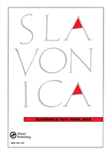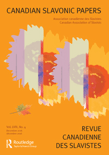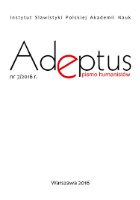
Zbornik Matice Srpske za Slavistiku-Matica Srpska Journal of Slavic Studies
metrics 2024
Illuminating Eastern European Cultures Through Research
Introduction
Zbornik Matice Srpske za Slavistiku - Matica Srpska Journal of Slavic Studies, published by Matica Srpska in Serbia, is a prominent academic journal focusing on the diverse and rich field of Slavic studies. With an ISSN of 0352-5007 and a commitment to advancing knowledge in linguistics, literature, and cultural contexts, this journal serves as a vital resource for researchers, professionals, and students alike. Although designated as an open access journal, its significance is highlighted by its ranking in the lower quartiles of 2023 across various categories, including Q4 in Linguistics and Language and Q3 in Literature and Literary Theory. The journal's Scopus rankings further reflect its position, with a percentile of just 8th for Language and Linguistics. These factors underscore the journal's ongoing contribution to Slavic scholarship from 2019 to 2024, fostering dialogue and exploration in a field that remains crucial for understanding Eastern European cultures and languages.
Metrics 2024
 0.11
0.11 -
- -
- 2
2Metrics History
Rank 2024
Scopus
JCI (Web Of Science)
Quartile History
Similar Journals

GLOTTA-ZEITSCHRIFT FUR GRIECHISCHE UND LATEINISCHE SPRACHE
Elevating Research in Greek and Latin LinguisticsGLOTTA-ZEITSCHRIFT FUR GRIECHISCHE UND LATEINISCHE SPRACHE, published by Vandenhoeck & Ruprecht GmbH & Co KG, stands as a pivotal academic journal within the field of Classics and Linguistics, demonstrating a strong commitment to advancing scholarly discourse surrounding the Greek and Latin languages. With a respectable Scopus ranking placing it in the top 77th percentile for Classics, this journal facilitates the dissemination of high-quality research and insights relevant to linguists, philologists, and historians alike. The journal operates without an open access model, ensuring its niche scholarship remains exclusive yet profoundly impactful. The HIndex is indicative of its longstanding influence, with the journal traces its roots back to its inception, with weighted contributions across several pivotal years. Furthermore, the journal's current standing—positioned in the Q2 quartile for Classics and Q3 quartile for Linguistics—reflects its thriving relevance and aspiration towards academic excellence, offering a significant platform for the exchange of ideas within the global scholarly community. Researchers, professionals, and students are encouraged to engage with the journal's contributions, as it consistently reflects the evolving dialogue in the study of ancient languages.

Studia Litterarum
Discovering the Essence of Literary Thought and TheoryStudia Litterarum, published by the esteemed Russian Academy of Sciences at the A.M. Gorky Institute of World Literature, serves as a vital platform for the exploration and analysis of literature and cultural studies. With an ISSN of 2500-4247 and an E-ISSN of 2541-8564, this open access journal has been disseminating valuable research since 2016, reaching a global audience keen on advancing the understanding of literary theory and cultural narratives. Based in Moscow, Russia, the journal has achieved remarkable academic recognition, holding a Q2 classification in Cultural Studies and a prestigious Q1 tier in Literature and Literary Theory, as of 2023. Its Scopus rankings underscore its relevance, with a notable placement in the 51st percentile for literature and literary theory and 27th percentile for cultural studies. Studia Litterarum not only opens doors to scholarly dialogue but also enhances the visibility of contemporary literary scholarship, making it an essential read for researchers, professionals, and students alike seeking to deepen their understanding of the intricate dynamics within literature and cultural studies.

SLAVONICA
Illuminating Slavic Heritage Through Interdisciplinary InquirySLAVONICA is a distinguished academic journal dedicated to the exploration and analysis of Slavic studies, incorporating a wide array of cultural, historical, and linguistic perspectives. Published by Routledge Journals, Taylor & Francis Ltd, this journal serves as a critical platform for interdisciplinary scholarship, emphasizing the dynamic nature of Slavic cultures and languages. Though it currently does not offer Open Access, SLAVONICA is an important resource for researchers, professionals, and students seeking to engage with the latest academic discourse in the fields of Cultural Studies, History, Literature, and Linguistics, achieving a recognized place in the Q4 quartile across several categories as of 2023. With coverage spanning from 1994 to 2024, and its commitment to fostering academic inquiry, SLAVONICA plays a vital role in elevating the understanding of Slavic heritage and contemporary issues, making it essential reading for anyone interested in the complexities of this region.

BULLETIN HISPANIQUE
Unveiling the Rich Tapestry of Hispanic DiscourseBULLETIN HISPANIQUE, published by PRESSES UNIV BORDEAUX, is a prominent academic journal dedicated to the interdisciplinary exploration of literature, linguistic studies, and historical analysis related to the Spanish-speaking world. Since its inception in 1972, the journal has established itself as a vital resource for researchers and scholars, achieving notable recognition across various categories—most recently characterized as Q2 in History, Q3 in Linguistics and Language, and Q1 in Literature and Literary Theory for the year 2023. Though it operates under traditional access models, BULLETIN HISPANIQUE maintains a commitment to scholarly excellence, offering insightful articles that contribute to the rich tapestry of cultural and linguistic discourse. With its Scopus rankings reflecting significant academic engagement, the journal serves as an essential platform for dialogue and discovery in the arts and humanities, appealing to a diverse audience of students, professionals, and academics committed to advancing knowledge in these vital fields.

Slavia-Casopis pro Slovanskou Filologii
Illuminating the Path of Slavic Academic InquirySlavia-Casopis pro Slovanskou Filologii is an esteemed journal dedicated to the advancement of Slavic philology, published by the SLOVANSKY USTAV AKAD CESKE REPUBLIKY in the heart of the Czech Republic. With its ISSN: 0037-6736, the journal serves as a vital platform for scholarly exchange, embracing a rich academic tradition since its convergence years beginning in 2002. The journal has achieved notable recognition, with a Q3 ranking in Linguistics and Language and a Q2 in Literature and Literary Theory as of 2023, highlighting its contribution to these dynamic fields. Although it does not currently offer open access, its rigorous selection of articles ensures that it remains a crucial resource for researchers and practitioners alike, facilitating a deeper understanding of Slavic languages and literature. Scholars benefit from the journal's extensive research backdrop, enhanced by its current ranks in the Scopus database, underscoring its significant placement within the academic literature landscape. The editorial scope of Slavia promotes innovative inquiries that reflect cultural, historical, and theoretical perspectives endemic to Slavic studies, making it indispensable for professionals, students, and enthusiasts invested in the exploration of Slavic linguistic and literary heritage.

Vestnik Sankt-Peterburgskogo Universiteta-Yazyk i Literatura
Cultivating Knowledge at the Confluence of Language and LiteratureVestnik Sankt-Peterburgskogo Universiteta-Yazyk i Literatura, published by ST PETERSBURG UNIV PRESS, stands as a pivotal academic journal in the fields of linguistics and literature, reflecting a profound commitment to the exploration of language and literary theory. With an ISSN of 2541-9358, this journal has steadily built its reputation since its inception in 2017, achieving impressive rankings in Scopus that place it within the top tiers of its categories—Q2 in Linguistics and Language and Q1 in Literature and Literary Theory as of 2023. The journal serves as an essential platform for researchers, professionals, and students who are keen to delve into the complex interactions between language and literature. Although currently not offering Open Access, its contributions are invaluable to advancing scholarly dialogue and fostering understanding within these vibrant fields. With a converged publication timeline extending through 2024, Vestnik Sankt-Peterburgskogo Universiteta-Yazyk i Literatura exemplifies the ongoing commitment to high-quality research and critical thought, making it an indispensable resource for those dedicated to the study of language and its literary manifestations.

Canadian Slavonic Papers
Exploring the Depths of Slavic ScholarshipCanadian Slavonic Papers, published by Routledge Journals, Taylor & Francis Ltd, is an esteemed peer-reviewed journal dedicated to the exploration of the Slavic, Eastern European, and Russian domains, fostering scholarly dialogue across multiple disciplines. With a robust focus on Cultural Studies, History, Linguistics, and Literature, this journal has firmly established its presence in the academic community, as evidenced by its Q1 ranking across various categories in 2023. Since its inception, Canadian Slavonic Papers has been a vital platform for researchers, professionals, and students alike, providing an invaluable repository of knowledge and insights from 1977 to the present. While not an open-access journal, it remains accessible through institutional subscriptions, ensuring a wide dissemination of scholarship. Located in the United Kingdom, the journal continues to contribute significantly to the understanding of Slavic studies within a global context, making it essential reading for anyone invested in this dynamic field.

Adeptus
Fostering Innovative Scholarship in Slavic StudiesAdeptus is a pioneering open-access journal published by the Polish Academy of Sciences, Institute of Slavic Studies, specializing in Slavic studies and cultural research. Since its inception in 2014, the journal has aimed to foster scholarly dialogue and advance knowledge across various disciplines related to Slavic languages, literature, history, and sociology. With an ISSN of 2300-0783, Adeptus has positioned itself as a vital resource for researchers, professionals, and students engaged in Slavic studies, offering a platform for high-quality, peer-reviewed articles that explore diverse topics within the field. The journal's open-access model promotes accessibility and dissemination of knowledge, making it a significant contributor to the academic landscape. Located in Warsaw, Poland, Adeptus continues to thrive as a key outlet for innovative research, inviting submissions that embody rigorous scholarship and insightful perspectives.

WELT DER SLAVEN-HALBJAHRESSCHRIFT FUR SLAVISTIK
Illuminating the Richness of Slavic ExpressionWelt der Slaven-Halbjahresschrift fur Slavistik is a distinguished academic journal dedicated to the field of Slavic studies, published by Harrassowitz Verlag. With a focus on the rich tapestry of Slavic languages, literature, and cultural theory, this journal provides a vital platform for scholars, researchers, and students interested in the complexities of Slavic linguistics and literary expression. It operates on a semi-annual basis, encompassing converged years from 2002 to 2015 and continuing from 2017 to 2024, ensuring a continuous dialogue in an evolving academic landscape. Despite its Q4 and Q3 rankings in various categories—such as Linguistics and Language, Literature and Literary Theory, and Visual Arts and Performing Arts—its impact is noteworthy, with Scopus ranks that place it within the upper percentiles of arts and humanities fields. While currently not an open access publication, it remains an essential resource for those engaged in the interdisciplinary exploration of Slavic cultures and their global significance. The journal emphasizes innovative research and critical analysis, making it a key contribution to the ongoing discourse in Slavistics.

Lingua Montenegrina
Pioneering Research in Montenegrin Linguistics and Cultural StudiesLingua Montenegrina is a distinguished academic journal dedicated to exploring and advancing the fields of Montenegrin language and literature. Published by the Institute of Montenegrin Language and Literature, this journal serves as a vital platform for researchers, educators, and students interested in the nuances and development of Montenegrin linguistics, literature, and cultural studies. With an ISSN of 1800-7007, it contributes significantly to the scholarly discourse in the region and beyond. While the journal operates under a traditional subscription model, it ensures that its readership has access to high-quality research that is pivotal for understanding Montenegrin identity and cultural expressions. The commitment of Lingua Montenegrina to rigorous academic standards and its focus on regional studies positions it as an essential resource for those looking to deepen their understanding of the Montenegrin language and its literary heritage.